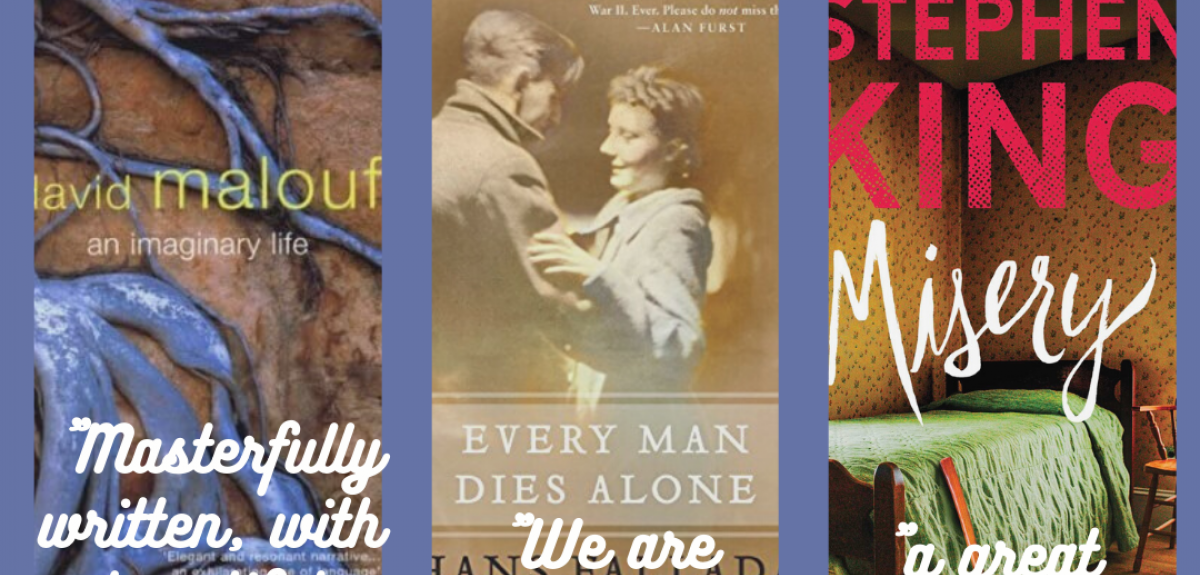
Book recommendations to celebrate World Literacy Day 2020
Today is International Literacy Day, a day dedicated to reading and learning. And while it can be hard to find time to read for fun during term time, it’s a great way to relax.
Three Oxford students shared their book recommendations and why they love them.
Read more below to find out why Alex, Christian and Matteo are so fond of these stories.
Alex Beukers, English, 3rd year – 'An Imaginary Life', David Malouf
"While studying English, I have read quite a few long, difficult books – but one of my all-time favourites happens to be a very short novella. David Malouf’s ‘An Imaginary Life’ is a fast-paced, impressionistic reworking of the myth of Ovid, during the Roman poet’s exile to the wild island Tomis. The story follows Ovid as he rediscovers nature, and his relation to it, as well as to a nameless, silent ‘Child’ who he befriends over the course of the novella. As an Australian, Postcolonial writer, Malouf is concerned with our experience of the ‘Other’, as well as unsettling our idea of what is ‘wild’ and what is ‘civilised’. The book is masterfully written, with beautiful passages about the natural world. I read it in one go and would recommend it to anyone who wants to be thinking about a book long after they’ve finished it!"
Christian Kirk, Biology, 3rd year – 'Misery', Stephen King
"One of my favourite horror books that I’ve read in the past few years has got to be ‘Misery’ by Stephen King. In this novel, famous author Paul Sheldon has been rescued by his self-proclaimed ‘biggest fan’ Annie Wilkes. Now, he is trapped in her small house, miles from anyone else. What makes this such a good example of horror is the strong feelings of claustrophobia and entrapment that the reader experiences, both through the plot and its framing. The focus on only two main characters, as well as a departure from King’s (often excessive) use of the supernatural, really allows you to get in the head of the characters and feel these events in a more realistic way, creating a more personal human element within the novel’s horrific events. Overall, this book encapsulates my favourite elements of horror, making a great (although suspenseful) read."
Matteo Baccaglini, PPE, 3rd year – 'Every Man Dies Alone', Hans Fallada
"One of my favourite books is Fallada’s ‘Every Man Dies Alone’ (1947), which retells the epic resistance of an ordinary husband and wife in wartime Berlin. Based on a true story, Otto and Anna leave hundreds of postcards across the city, with battle-cries to resist the Nazi regime. They are eventually discovered, arrested, and tried. Otto is executed, while Anna dies when her prison is bombed. Fallada wrote the book from a mental institution, in which he was battling to overcome his addictions to morphine and alcohol, in a mere 24 days – but he died weeks before the novel was published. So ‘Every Man Dies Alone’ reads somewhat like a draft that was never properly polished. Curiously, that also means it communicates the rawness of wartime and post-war Berlin – in a gripping page-turner that is difficult to put down. I loved how intimately Fallada brings us to his characters, taking us to the very depths of their emotions. We are transported and immersed in their world. His painting of Berlin equally spares no details. It's a book overwhelmed with grief and indignance."
What do you love to read for fun? Let us know your recommendation on Facebook and Twitter.
 Improving digital tools you use at Oxford
Improving digital tools you use at Oxford
 Student story: Anree Bektashi-Brown
Student story: Anree Bektashi-Brown
 Student story: Elif Bayat
Student story: Elif Bayat
 Student story: Ras.I.Martin
Student story: Ras.I.Martin
 MyOxford app student experience: Justin Xu
MyOxford app student experience: Justin Xu